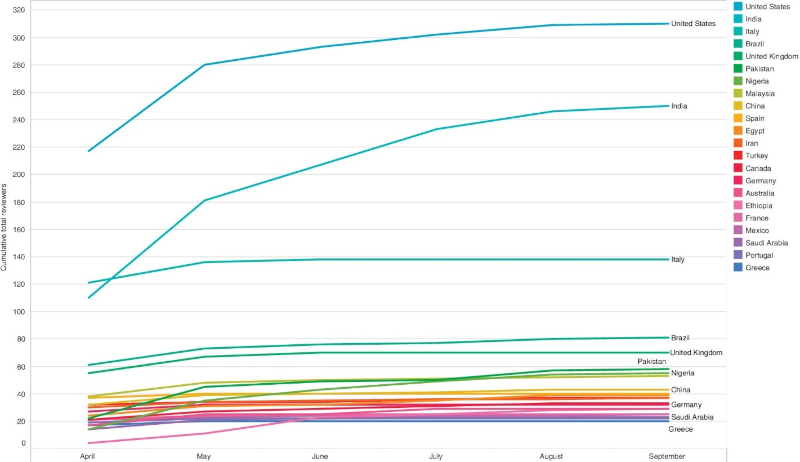With the vital help of the scientific community - not only have we coped with the upsurge in submissions, but we have also been able to publish more quickly.

Peer review during the pandemic
The emergence of the coronavirus pandemic created the perfect storm for scientists. As international lockdowns prevented conference travel, fieldwork trips and days in the lab, many researchers made the most of their time at home by writing up papers and preprints – creating an unprecedented surge in submissions to academic journals. Although submissions increased across all subjects, the dominance of COVID-19 related submissions created a clamour for suitable reviewers, overwhelming key academics in the field who were being asked to review nearly every submission (or what felt like every submission!).
At the same time we were hearing constantly from researchers how hard it was to find time to review for us during the COVID-19 pandemic, especially alongside all the extra unexpected responsibilities such as home-schooling.
Despite this - with a bit of flexibility, and with the vital help of the scientific community - not only have we coped with the upsurge in submissions, but we have also been able to publish more quickly, so thank you!
A focus on rapid review
The emergence of the pandemic led the Royal Society and other publishers to collaborate and put out a call for researchers from around the globe to act as COVID-19 rapid reviewers. We were humbled by the response with over 1500 signing up within a few days. The response from the countries underrepresented in peer reviewer pools was most encouraging, with the Global South well represented. Many of the rapid reviewers were invited to review by publishers within the collaboration and outside it. Across science, we would like to use more reviewers from underrepresented regions – so please register with services such as Web of Science Reviewer Recognition Service (previously branded as Publons) so that our systems can include you and be visible to editors.
The figure shows COVID-19 rapid reviewer sign up rates based on country of origin, from April until September 2020.

Recognising reviewers
Researchers have told us that their main reasons for reviewing are to play their part as a member of the academic community, and to reciprocate the benefit gained when others review their papers. They also tell us that they value recognition. As a publisher, we are happy to recognise the efforts of our reviewers in several ways. Each year our journals publish annual articles listing reviewers (who have opted to be included). This modern twist on the traditional approach is to provide a citable DOI, which helps researchers to receive recognition for their work as a genuine research output. Our journals are integrated with the Web of Science Reviewer Recognition Service. This means our reviewers have the opportunity during the peer review process to easily opt into receiving recognition. Furthermore, it is really easy from Web of Science Reviewer Recognition Service to add this recognition to your ORCID profile.
We also strive to make reviewing for us a rewarding experience in a number of other ways:
• We minimise any time wasted by filtering low quality papers at editorial triage
• We take measures to improve the matching of an article with the right reviewer
• We are simplifying the reviewer forms in the light of your feedback
• We are always developing guidance and resources for reviewers (and are always keen to know how we could do more.)
2020 reviewer articles
• Biology Letters
• Journal of the Royal Society Interface
• Open Biology
• Proceedings of the Royal Society A
• Proceedings of the Royal Society B
• Royal Society Open Science
Review for us
Find out more about the benefits of reviewing for the Royal Society and if you would like to be added to our international pool of reviewers, please contact us at publishing@royalsociety.org.
